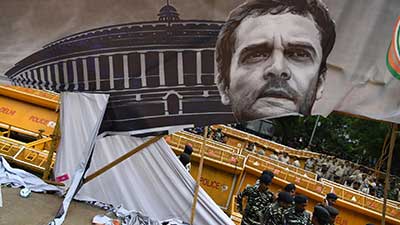Date: 25/03/2023
Relevance: GS-2: Salient Features of the Representation of People’s Act.
Key Phrases: Election Commission of India, Representation of People Act 1951, Section 499 and 500 of Indian Penal Code, Article 103 of the Constitution of India, Separation of Power, Electoral Rolls.
Context:
- Recently, a Congress leader and MP, was held guilty and sentenced to
two years in jail in a 2019 defamation case over his remarks about the
PM of India by a court in Gujarat’s Surat.
- The conviction came over his remarks about the “Modi” surname.
- The remarks were made during a rally in Kolar, Karnataka, in the run-up to the 2019 Lok Sabha elections.
Key Highlights:
- The court of Chief Judicial Magistrate held him guilty under Indian Penal Code sections 499 and 500.
- The court also approved Gandhi’s bail on a surety of Rs 15,000 and suspended the sentence for 30 days to allow him to appeal.
Disqualifications of a Lawmaker (MP/MLA):
- Disqualification of a lawmaker is prescribed in three situations.
- First is through the Articles 102(1) and 191(1) for
disqualification of a member of Parliament and a member of the Legislative
Assembly respectively.
- The grounds here include holding an office of profit, being of unsound mind or insolvent or not having valid citizenship.
- The second prescription of disqualification is in the Tenth Schedule of the Constitution, which provides for the disqualification of the members on grounds of defection.
- The third prescription is under The Representation of The People Act
(RPA), 1951.
- The disqualification of an MP convicted for an offense can happen in various instances.
- If the offense for which he is convicted is listed in Section
8(1) of the Representation of the People Act of 1951.
- This includes offenses such as-
- Section 153A- Offense of promoting enmity between different groups on ground of religion, race, place of birth, residence, language, etc., and doing acts prejudicial to maintenance of harmony or
- Section 171E- Offense of bribery or
- Section 171F- Offense of undue influence or personation at an election and a few others.
- If the lawmaker is convicted for any other offense but is
sentenced for a period of two years or more.
- Section 8(3) of the RPA mandates that an MP can be disqualified if convicted and sentenced to not less than 2 years of imprisonment.
- Under the RPA, Section 8(4) stated that the disqualification takes effect only “after three months have elapsed” from the date of conviction.
- Within that period, lawmakers could file an appeal against the sentence before the High Court.
- However, in the landmark 2013 ruling in ‘Lily Thomas v Union of India’, the Supreme Court struck down Section 8(4) of the RPA as unconstitutional.
- Section 9 deals with disqualification for dismissal for corruption or disloyalty, and for entering into government contracts while being a lawmaker.
- Section 10 deals with disqualification for failure to lodge an account of election expenses.
- Section 11 deals with disqualification for corrupt practices.
Defamation
- About:
- Defamation is a wrong that deals with damage caused to a person’s reputation.
- In India, defamation can both be a civil wrong and a criminal offense, depending on the objective they seek to achieve.
- Section 499 of the IPC:
- It defines what amounts to criminal defamation and subsequent provisions define its punishment.
- It elaborates on how defamation could be through words –
spoken or intended to be read, through signs, and also through
visible representations.
- These can either be published or spoken about a person with the intention of damaging the reputation of that person, or with the knowledge or reason to believe that the imputation will harm his reputation.
- Section 500 of the IPC:
- It prescribes for defamation a simple imprisonment for a “term which may extend to two years, or with fine, or with both.”
Way Forward:
- The disqualification can be reversed if a higher court grants a stay
on the conviction or decides the appeal in favor of the convicted
lawmaker.
- In a 2018 decision in ‘Lok Prahari v Union of India’, the Supreme Court clarified that the disqualification “will not operate from the date of the stay of conviction by the appellate court.
- Significantly, the stay cannot merely be a suspension of sentence under Section 389 of the Code of Criminal Procedure (CrPC), but a stay of conviction.
- Under Section 389 of the CrPC, an Appellate Court can suspend the sentence of a convict while the appeal is pending.
- This is akin to releasing the appellant on bail.
- Another option which is available for the MP is approaching the
President.
- As per Article 103 of the Constitution, the disqualification case of an MP will be decided by the President in consultation with the Election Commission.
- It is up to the MP to appeal to the President invoking Article 103.
Conclusion:
- The provision of section 8 of RPA 1951 is aimed at “preventing criminalisation of politics” and keeping ‘tainted’ lawmakers from contesting elections.
Source: The Hindu
Mains Question:
Q. What is Defamation? What do you understand about Civil defamation and Criminal defamation? (250 Words).







